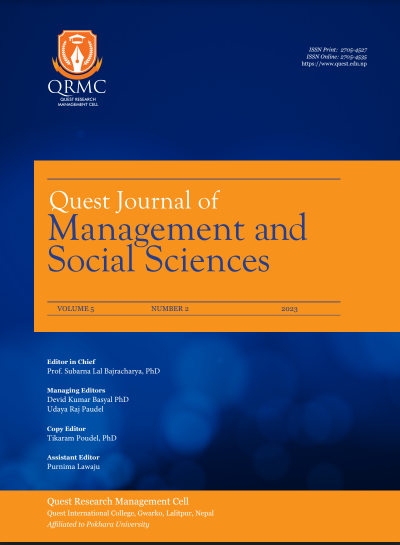Human Resource Management Practices and Performances in Nepalese Financial Institutions
DOI:
https://doi.org/10.3126/qjmss.v5i2.60930Keywords:
Compensation, Leadership, Empowerment, Motivation, Employee PerformanceAbstract
Background: This study explores the dynamic relationship between human resource management practices and employee performance in Nepalese financial institutions. It investigates eight key elements, including Financial Compensation, Non-Financial Compensation, Leadership, Coaching, Empowerment, Participation, Organization Culture, and Motivation to address the research objectives.
Objectives: The primary aim of this research is to analyse the impact of various human resource practices on employee performance in Nepalese financial institutions. Eight hypotheses are formulated, each targeting the relationship between Employee Performance and one of the essential components.
Methods: The primary data collection instrument for this study is a structured questionnaire. This survey is being conducted on employees at various financial institutions in Nepal. The sample comprises 405 respondents. Descriptive and inferential statistical procedures, such as correlation analysis, regression analysis, and One-Way ANOVA, are used to analyse the collected data.
Results: Regression analysis reveals a significant positive relationship between financial compensation and employee performance, emphasizing its crucial role. Conversely, no substantial relationships are found between employee performance and non-financial compensation, leadership, coaching, empowerment, participation, organisational culture, or motivation. The ANOVA test highlights the significance of job position, particularly in managerial roles, on employee performance.
Conclusions: This study emphasises the critical role of an effective financial compensation system in improving employee performance in Nepalese financial institutions. While several human resource practices showed no significant impact, it emphasises the need to tailor these practices to specific job functions. These findings have significance for Human Resources Managers, guiding them in optimising practices for improved employee performance and organisational productivity.
Keywords: Compensation, Leadership, Empowerment, Motivation, Employee Performance
Paper Type: Research paper
JEL Classification: G21, J32, J33, M52, M54
Downloads
Downloads
Published
How to Cite
Issue
Section
License
Copyright (c) 2023 Quest Journal of Management and Social Sciences

This work is licensed under a Creative Commons Attribution-NonCommercial-NoDerivatives 4.0 International License.
This license enables reusers to copy and distribute the material in any medium or format in unadapted form only, for noncommercial purposes only, and only so long as attribution is given to the creator.




